How to measure infrastructure health across an entire portfolio
Published on July 31st, 2025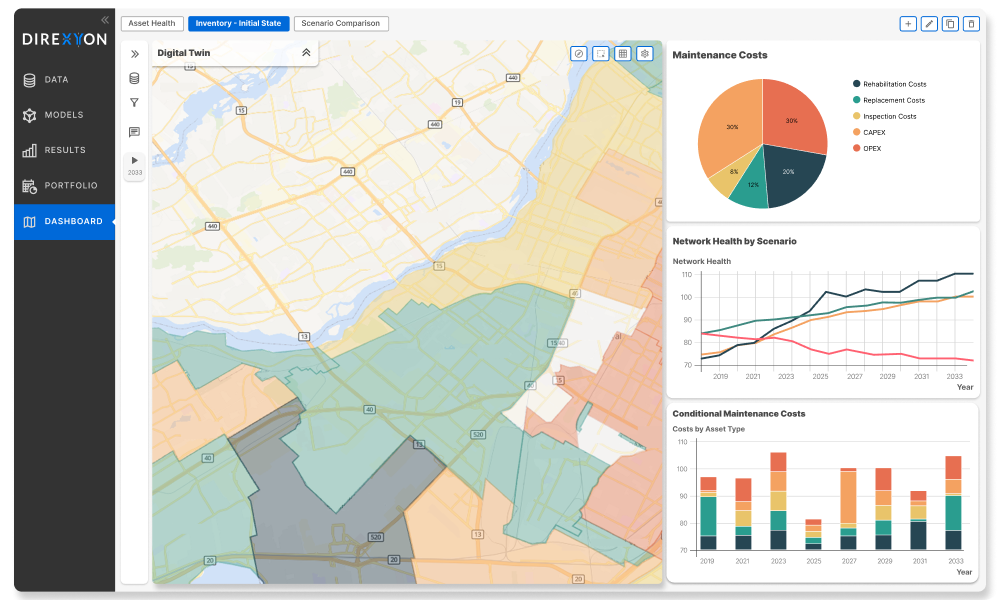
Whether you’re managing water networks, electrical grids, transit systems, or public facilities, assessing infrastructure health is a complex, ongoing challenge.
Each asset comes with its own degradation patterns, maintenance needs, and service expectations. Yet organizations must find a way to measure infrastructure health in a standardized, strategic, and scalable way, especially when capital planning decisions hinge on the results.
Fortunately, with modern tools like DIREXYON, organizations can go beyond spreadsheets and static reports. They can build dynamic, asset-centric scenario analyses that empower smarter investment decisions.
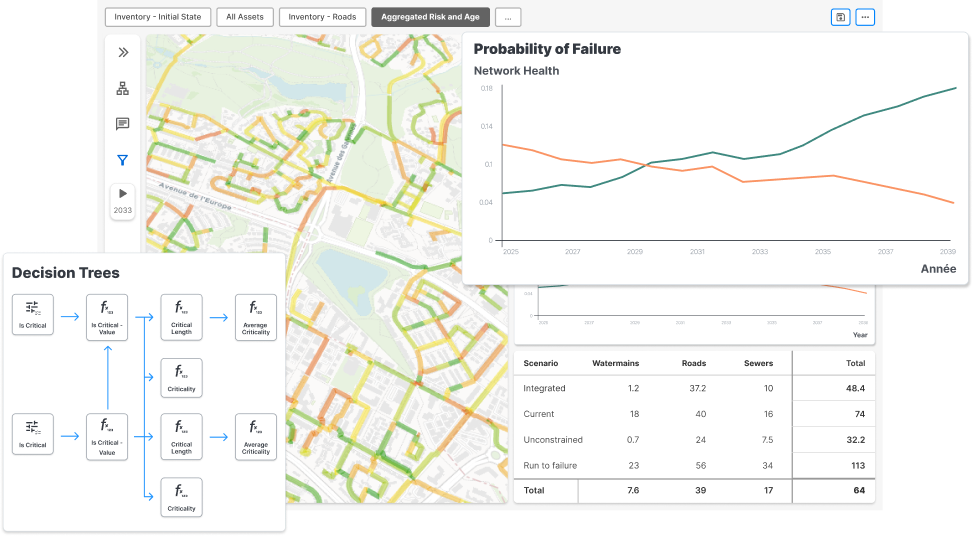
Step 1: What is a healthy asset?
Every asset type degrades differently—a highway deteriorates through wear and weather; a water main through corrosion or pressure cycles; a facility system via age or code changes. Defining health means selecting asset-specific criteria: structural integrity, pressure ratings, material condition, functionality, or regulatory compliance.
With DIREXYON Suite, you can craft these asset-class definitions through user‑configurable KPIs, decision‑tree logic, and risk thresholds tailored to each type. The suite supports custom degradation models and condition indicators, enabling you to formalize what “healthy” means for bridges, pipes, roads, and substation, as well as how they all function within the hierarchies of your portfolio.
Step 2: Combine data with expertise
A holistic health assessment blends rawdata with human insight from subject matter experts like asset managers, engineers, field staff, and planners.
DIREXYON’s Asset Investment Planning (AIP) platform integrates data from disparate sources—GIS, CMMS/EAM, SCADA, spreadsheets—and pairs it with expert-formulated policies and decision logic.
Its drag‑and‑drop decision trees let you encode judgment into models that feed into health scores and outcomes.
This hybrid model ensures that asset health ratings are both quantitative and context‑aware, balancing objective measurements with expert reasoning.
Step 3: Simulate health over time
Static snapshots only tell half the story. To truly understand infrastructure health, you must project asset evolution under real-world conditions: deferred maintenance, rehabilitation, replacement, or fluctuating budgets.
DIREXYON AIP uses configurable degradation curves, stochastic simulations, and risk-consequence matrices to forecast asset conditions and failure probabilities across 10, 25, or even 50 years.
You can test “what-if” scenarios like:
- What happens if you defer water main replacements by five years?
- How does increasing your sewer rehab budget affect network reliability?
This forward-looking simulation allows you to proactively plan — rather than reactively respond — to emerging risks.
The Benefits of Simulating What-Ifs
A Canadian municipality used DIREXYON’s forecasting to align watermain and road rehabilitation, reducing total lifecycle costs by 27% over a 15-year horizon.
Click Here
Step 4: Integrate with investment planning
Measuring health is useful—but the real value comes when it informs capital planning and investment decisions.
DIREXYON’s platform merges health outputs with budget forecasts, risk thresholds, and service objectives to recommend optimal investment strategies.
The tool supports scenario comparison: prioritize high-risk segments, delay replacements, or bundle projects for efficiency—and instantly quantify cost vs. risk vs. performance outcomes.
Decisions can be aligned with CAPEX/OPEX constraints, risk tolerance, and service target levels.
Step 5: Auditability, Compliance & Transparency
In many regulated sectors—particularly utilities and municipalities—compliance and audits matter. DIREXYON’s cloud‑based, centralized data model creates a single source of truth that’s inherently more transparent than spreadsheets or fragmented systems. It supports ISO 55000 frameworks and provides audit trails of data, calculations, and decisions.
Dashboards and reporting tools allow asset teams to filter by geography, type, or department—and communicate trends and funding needs clearly with stakeholders and regulators.
Infrastructure health as a strategic business tool
When measured well, infrastructure health transcends a KPI—it becomes a strategic tool that empowers data‑driven investment, reveals risk early, and aligns policy with operational reality.
DIREXYON’s Asset Investment Planning platform equips organizations to unify definitions, blend data and expert judgment, forecast future conditions, and optimize funding decisions—delivering actionable insight across your asset portfolio.
If you’re managing roads, transit, water or facilities, deploy a tool built for the long term. Measure what matters—and be ready for any future.
Discover a smarter, data-driven way to manage your infrastructure
Let us show you how it works
Our product specialists will walk you through our proven approach to enhance your capital investment planning.

Explore resources
-
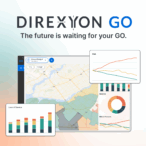 News
NewsDIREXYON Launches GO, an AI-Powered Platform to Streamline Strategic Infrastructure Investments
Read more : DIREXYON Launches GO, an AI-Powered Platform to Streamline Strategic Infrastructure InvestmentsSelf-serve Digital Twin delivers clarity to strategic infrastructure decisions Montreal, QC, September 18, 2025 – DIREXYON Technologies today announced the launch of DIREXYON GO, a self-serve platform that simplifies and accelerates Asset Investment Planning (AIP) for municipalities and utilities. DIREXYON…
-
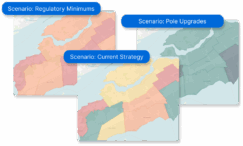 E-book
E-bookTurning Wildfire Data into Smarter Investments
Read more : Turning Wildfire Data into Smarter InvestmentsYour wildfire data can do more than predict where fires may spread. It can guide the decisions that protect your grid and your communities. Wildfire threats are rising, regulations are tightening, and budgets are stretched thin. Utilities need more than…
-
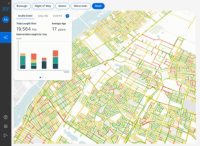 Blog
BlogWhat is Strategic Asset Management?
Read more : What is Strategic Asset Management?Strategic Asset Management is more than a buzzword. It’s a transformative shift in how municipalities and electric utilities manage infrastructure, budgets, and long-term risk. At its core, strategic asset management is about using data to make better decisions. Instead of…